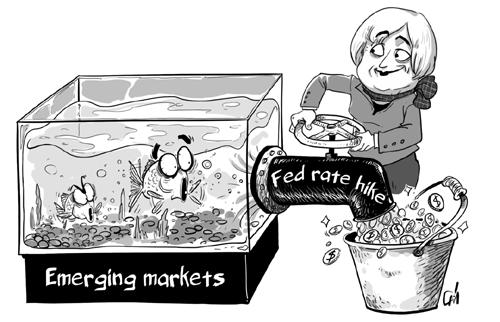US Fed rate hike will test emerging markets
- By Dan Steinbock
 0 Comment(s)
0 Comment(s) Print
Print E-mail China Daily, December 24, 2015
E-mail China Daily, December 24, 2015

The US Federal Reserve raised interest rates by 25 basis points last week, taking the first step away from its near-zero interest rate policy. Led by its chairman Janet Yellen, the Fed sought to defuse market tensions by signaling a "gradual" pace of rate hikes to come. Yet the Dow plunged 367 points, while the S&P 500 and the Nasdaq lost 1.5 to 2 percent.
In the United States, rising rates will reward investors but increase the borrowing costs for consumers amid the earnings and revenue slump, and sluggish growth. At the Fed, concerns linger over China's growth slowdown. Besides, rate hikes will reinforce the sharp plunge of energy prices, while sending the US dollar climbing.
So, what will be the impact on China?
When the Fed began its rate hikes about a decade ago, the Chinese economy was about one-fourth of what it is today and its financial markets were largely insulated from the outside world. These privileges are now gone. Today, China is the world's second-largest economy and the renminbi has been included in the International Monetary Fund's basket of elite currencies. And despite controls, it is far more exposed to global capital flow risks.
And what about the impact of the Fed's actions on China's external trade and international investments? US critics claim that a weakening RMB will make Chinese exporters more competitive. Yet things are now a bit more complex. In the past, the mainland's growth relied on trade. Today, with the slump of world trade and the rebalancing toward consumption, net exports play a less vital role in GDP growth, while Chinese direct investment has soared internationally.
Ever since early 2014, the US dollar has strengthened relative to the RMB, which is expected to weaken over the next year as well. That is partly because of a slower 6.5 percent growth target for the 2016 to 2020 period and partly because of the Belt and Road Initiative, which implies more outward direct investment from China. In November, China's foreign reserves fell by $87 billion, though it still has $3.44 trillion in reserves.
In the short term, that means moderate weakening and occasional volatility of the RMB; in the longer term, it means strengthening of the Chinese currency's resilience.
If the Fed's rate hikes will test the endurance of China's rebalancing and its "long landing", the impact will be a lot worse in many emerging and developing economies.





